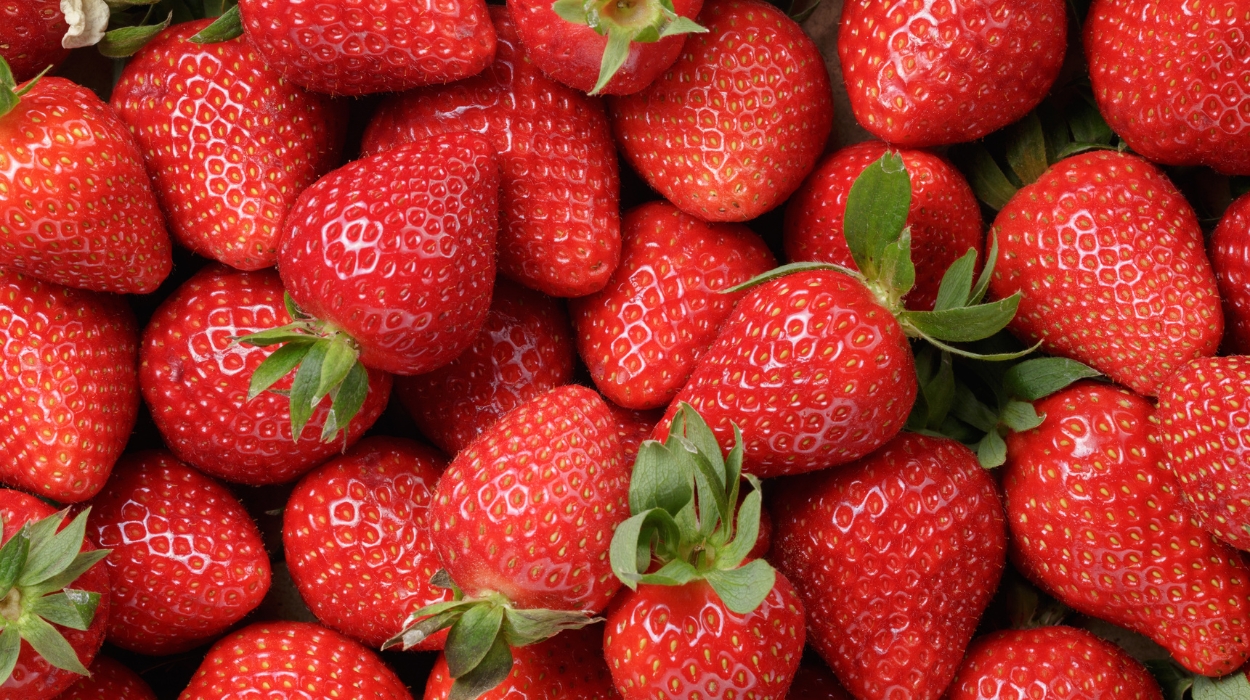Strawberries are reddish, cone-like shaped fruits with a delicious combination of sweet-tart taste and delightful aroma. They are widely used in cooking, especially desserts like cakes, pies, and smoothies, due to their sweet aroma and flavor.
Did you know that every year, the 27th of February is marked as National Strawberry Day? Well, you may wonder what strawberry benefits are available for the fruit to have such a special day.
Indeed, strawberry leaves benefit our health and overall wellness. In fact, among the numerous fruits for weight loss, strawberries stand out to lower unhealthy fat levels. They can also contribute to heart health, optimal sugar levels, and much more. It is time to dive in.
Health Benefits Of Strawberry
- Maintain optimal cholesterol levels.
- Improve cardiovascular health.
- Boost the immune system.
- Control blood glucose levels.
- Decrease oxidative stress.
- Improve cognitive function.
- Enhance gut health.
Health Benefits Of Strawberries

In this section, we have outlined seven scientifically verified health benefits of strawberries.
Maintain Optimal Cholesterol Levels
Are you wondering how strawberries can contribute to weight loss? Researchers conducted a study to determine the effects that daily strawberry consumption had on obese adults with high LDL-C cholesterol. Results showed that two-and-a-half servings of strawberries daily for four weeks significantly improved insulin resistance.[1]
Low-density lipoprotein, or LDL-C, is bad cholesterol that stimulates the accumulation of plaques in the blood vessels and causes atherosclerosis. The study further shows that strawberries can increase high-density lipoprotein cholesterol, or HDL-C, which is good cholesterol.
Strawberries are also low in calories, which makes them a great way to reduce calorie intake and prevent weight gain.
Improve Cardiovascular Health
You can improve the health of your heart and reduce your risk of heart disease by eating fresh strawberries. Research shows that strawberry supplementation[2] lowers levels of circulating LDL-C, total cholesterol, and diastolic blood pressure.
Boost The Immune System
Berries like strawberries offer a variety of vitamins, minerals, and bioactive substances that aid in physiological functioning. Strawberries are a rich source of vitamin C,[3] which has been shown to boost the body’s immune system.
White blood cells such as neutrophils amass vitamin C, which helps the immune system. This can improve the process of cell ingestion, cell movement, and the production of reactive oxygen species, which allows molecules to exist independently.
Vitamin C and other bioactive substances in strawberries aid in fighting infections and chronic diseases, which improves immunity.
Control Blood Glucose Levels
A 2023 study indicates using strawberry extract as a therapeutic intervention[4] for diabetic rats leads to a significant decrease in blood glucose levels. Results showed that average-weight adults with insulin resistance but no diabetes demonstrated enhanced insulin sensitivity. This occurred after a six-week dietary intervention with 333 milligrams of polyphenols from strawberries and cranberries.
These studies suggest that strawberries contain potent substances like antioxidants and phenolic compounds that have been noted to regulate blood sugar, exerting antidiabetic activity.[4]
Decrease Oxidative Stress
The process of oxidative stress occurs due to an imbalance between the production of free radicals and the body’s ability to neutralize them. This can lead to potential damage to cells, proteins, and DNA. It plays a crucial role in promoting the aging process and health-related conditions like cancer.
Research shows that phytochemicals in strawberries[5] suppress oxidative stress by reducing the production of ROS and oxidative biomarkers. This replenishes the activities of antioxidant enzymes and inflammatory processes by regulating the markers of inflammation that cause diseases.
Improve Cognitive Function
Studies have demonstrated that eating berries such as strawberries affects metabolism and cognitive function, which may reduce the incidence of dementia.[6] Scientists propose that the neuroprotective factor in action could be the anthocyanins, bioactive elements found in strawberries and other fruits.
Enhance Gut Health
Another point in strawberry health benefits is that it improves gut health. Strawberries can improve gut health and aid digestion since they contain a lot of dietary fiber and polyphenols. These fibers help in digestion and make the gut suitable for beneficial gut bacteria.
The antioxidants and anti-inflammatory properties present in the polyphenols enhance gut health holistically.
Findings from a recent study show that strawberry consumption in healthy participants is linked to the quantity of gut microbes.[7] These can contribute to lean body weight, health, and lifespan. Therefore, strawberries can be an appealing way to nourish your digestive system and maintain the right microbes.
What Are Strawberries?

Strawberries[8] are bright red berries of the genus Fragaria and the Rosaceae family, known for their sweet and juicy flavor.
In botanical terms, they are false fruits. This means they are aggregate fruits with a tiny edible seed inside each berry. In 2012, the United States accounted for 29% of global strawberry production and was the world’s top producer with over 36 billion pounds.
Strawberries are packed with essential nutrients, making them beneficial to health. Because of their nutritional value, they are used as ingredients for fruit and vegetable supplements and even the best green powders.
They are rich in manganese and calcium, which helps females prevent osteoporosis, especially in those who are postmenopausal. Strawberry benefits for men primarily come from vitamin C, which may contribute to improved sperm quality and reduce oxidative stress, potentially benefiting male fertility.
Dietary fiber from strawberries helps digestion, and anthocyanins are good for the heart. These fruits are versatile and can be eaten dried or fresh in desserts or salads.
Strawberry Nutrition Facts
Strawberries have an excellent nutritional composition and are a fine addition to any healthy diet. The United States Department of Agriculture[9] has provided the nutritional value of strawberries.
Composed of 90.8 grams of water, they are moistening and low in calories — only 4 calories per 100 grams. Strawberries’ mild flavor, high water content, and low protein at 0.64 grams make them a light but nutritious snack food with the bonus of a mere 0.22 grams of fat.
The carbohydrates in strawberries are mainly natural sugars. There are just 7 grams of sugar in 100 grams of strawberries, along with 2.24 grams of glucose, 2.62 grams of fructose, and a small number of other sugars. The berry’s unique flavor is due in part to high organic acid content, with 700 milligrams of citric and 198 milligrams of malic appearing as the standouts.
Strawberries are rich in various minerals. A 100-gram serving of strawberries contains 17 mg of calcium and 0.26 mg of iron. Magnesium, phosphorus, potassium, sodium, zinc, copper, and manganese are also found in strawberries. All these minerals serve important functions in physiology and promote health.
Additionally, strawberries are high in vitamin C, as they contain 59.6 mg per 100 grams. Antioxidant vitamin C can help the immune system and promote collagen synthesis. Furthermore, strawberries contain a small quantity of biotin — <3.7 µg — which has several beneficial effects on the body.
Strawberry Allergy
Strawberries, like many other foods, can cause certain body reactions or allergies that could be potentially dangerous, although they are quite rare. The symptoms are usually itchiness, hives, coughing, wheezing, diarrhea, nausea, vomiting, and dizziness. In severe cases, shortness of breath and even anaphylactic shock may occur.
Additionally, oral allergy syndrome can occur, in which people who are allergic to birch pollen may also react negatively toward strawberries. Allergy testing is part of diagnosis, and treatment for strawberry allergy consists largely of avoiding intake of the fruit in any form. This is the case for dried, fresh, and frozen strawberries, along with any products made from them.
People who suffer from established strawberry allergies must check labels on food products and avoid strawberry-containing foods. Do notify your doctor in the event of a severe reaction, as such reactions should be addressed with immediate medical treatment.
Tips To Eat Strawberries
As part of eating healthy, the following tips can help you enjoy the benefits of eating strawberries every day.
- Fresh and ripe: Select plump, full strawberries that are bright red and green on top. This is a check for ripeness and flavor.
- Wash thoroughly: Wash strawberries under a cold tap before eating to wash away any dirt or pesticides. Do not wash them until shortly before eating. Otherwise, they will spoil.
- Simple snacking: Strawberries can be eaten alone or with a dollop of yogurt for nourishment. They make a guilt-free treat and satisfy your sugar cravings with their inherent sweetness.
- Creative pairings: Add strawberries to your salads, smoothies, green powder, and desserts for a pop of flavor with added nutrition.
Conclusion
The myriad benefits of strawberries extend beyond their delicious taste. Rich in antioxidants, vitamins, and fiber, strawberry nutrition supports heart and gut health, boosts immunity, and offers versatile culinary possibilities.
If you are looking for a change, then hesitate no more and embrace these vibrant berries as a delicious and nutritious addition to your daily diet for overall well-being.
Frequently Asked Questions
Consuming strawberries offers benefits to various body organs and overall well-being. It contributes to a healthy brain and heart and aids digestion via its fiber content.
It is challenging to designate a single fruit as the healthiest, as different fruits offer unique nutritional benefits. However, some widely recognized for their overall health benefits include strawberries, blueberries, apples, kiwis, and bananas.
The health benefits of strawberries include lowered cholesterol levels and improved heart and gut health. They can also strengthen the immune system, enhance cognitive functions, and be an anti-diabetic activity.
Yes, eating strawberries every day is a good practice. They are low in calories and high in vitamins, antioxidants, and fiber, supporting overall health, heart health, and immune function.
Strawberries contain vitamin C, antioxidants, and phytochemicals that reduce oxidative stress, prevent aging, and keep the skin glowing.
Strawberries are nutritious, with many health benefits, but it is difficult to conclude that any one fruit is the most healthy. Variety is the best way to ensure a wide range of nutrients in your fruit.
 Evidence Based
Evidence Based
